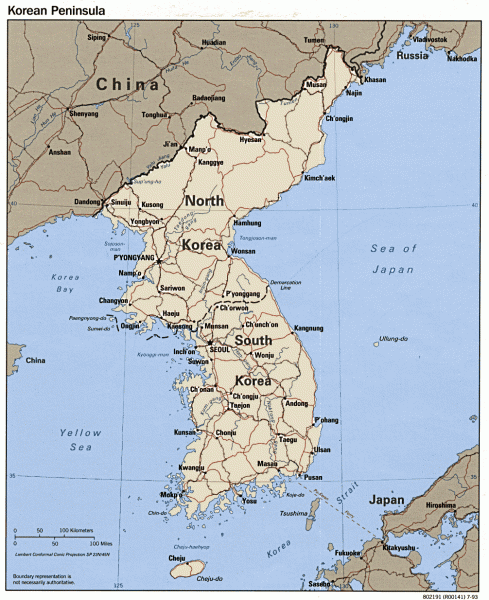 Well, absolutely not, but you could be forgiven for thinking so, based on a cursory review of recent headlines.
Well, absolutely not, but you could be forgiven for thinking so, based on a cursory review of recent headlines.
Although it hasn't made much of a splash stateside, the big news in the South this week is the "marijuana scandal" surrounding a singer from the suggestively named K-pop boy-band Big Bang, who goes by the stage-name T.O.P.
He could face five years in the slammer after a hair follicle test by the Seoul Metropolitan Police yielded positive results for cannabis. He was fingered for the test after a young woman busted for "liquid marijuana" (presumably some kind of extract) named him as the supplier, according to Korea Portal.
The affair could spell the end of Big Bang, whose massive and ravenous fan base makes them practically a mini-industry in South Korea—although the members approaching the age of mandatory military service was already a looming reality. Ironically, the stress of his cannabis case could be driving T.O.P. to harder stuff—last week he was found unconscious from an apparent overdose of tranquilizers. (An example of prohibition itself paradoxically making the bogus "gateway drug" theory a self-fulfilling prophecy.)
The T.O.P. affair affords Korea Exposé website the opportunity to look at the "taboo" nature of cannabis in the Republic of Korea, which officially declares itself a "drug-free nation." Of course such claims are always empty, and are now rendered transparently so by the high-profile travails of the unfortunate T.O.P.
The account notes that the hemp plant has been grown on the Korean peninsula for thousands of years, known locally as daema and primarily used to make rope and the traditional fabric called sambe. The seeds were used as a laxative in folk medicine. It wasn't outlawed in the South until the Narcotics Act was enacted in 1957 by the dictatorial Syngman Rhee regime, under Washington pressure. But even then, the law only mentioned "Indian marijuana"—technically leaving the local product legal. It wasn't until the 1960s that smoking the stuff caught on with the youth. Herbaceous marijuana is known as daemacho—or, in the youth slang of the day, "happy smoke."
This prompted a vigorous crackdown by dictator Park Chung-hee—South Korea's longest-ruling military strongman (1961-1979), and the father of the recently ousted president Park Geun-hye. Park imposed curfews and regulations on hairstyles and dress, aimed at crushing the budding counterculture, and the technical loophole in the law soon became irrelevant. Conservative values were emphasized in Park's New Village Movement. After Shin Joong-hyun, hailed as the Godfather of South Korean rock, was so indiscrete as to write an article about his "happy smoke" experience in Sunday Seoul magazine in 1973, he came under official scrutiny. Two years later he was arrested and imprisoned for four months for possession of daemacho, and faced torture at the hands of his jailers. Nothing lightened up for the herb even after democratic rule was finally instated after a long student protest movement in 1988.
Then there's the North—now much in international news over its rogue nuclear program. The latest splash came when basketball bad-boy Dennis Rodman arrived in the Democratic People's Republic of Korea this week for his latest meeting with his good pal Kim Jong-un—bearing a copy of Donald Trump's The Art of the Deal as a gift to the Supreme Leader. (An appropriate gift, given the mutual if grudging admiration between Kim and Donald.) But the story really took a turn for the surreal with news that Rodman's junket is being sponsored by PotCoin, the digital crypto-currency used for legalized cannabis in places like Colorado.
Maybe Rodman (or PotCoin?) fell for the persistent claims that cannabis is legal in the DPRK—one of those false Internet rumors about the weed that refuses to die. This all started with a 2013 post by travel blogger Damon Richter, who claimed to have seen cannabis in a market stall in North Korea's port of Rason. He has long since been called out on his error. Examining his claim, The Guardian found that what Richter saw was ip tambae—a mixture of uncured tobacco leaf and other herbs smoked in lieu of hard-to-get cured tobacco. And no, those other herbs don't include cannabis, which is neither tolerated nor available in the DPRK—unlike methamphetamine, alas. That isn't tolerated either, but it's very much available, and exacting a high social cost. If personal users in North Korea are being sent to the firing squad for meth rather than pot, that's only because there isn't any pot.
The confusion between marijuana and hemp—that is, the smokable and industrial varieties of the cannabis plant—has helped keep this misconception alive. For instance, there was the recent story that North Korea is "fueling drones with pot"—based on a Radio Free Asia report that Kim's regime was encouraging cannabis cultivation to produce hemp oil as a fuel for the military. But again, that's rope not dope.
Sorry, but we don't think Rodman and Kim are going to be blowing any blunts in Pyongyang.
Cross-post to High Times
Graphic: Perry-Castañeda Library Map Collection







Recent comments
2 weeks 6 days ago
3 weeks 5 hours ago
6 weeks 23 hours ago
7 weeks 5 hours ago
11 weeks 12 hours ago
14 weeks 5 days ago
18 weeks 6 days ago
19 weeks 4 days ago
29 weeks 4 days ago
33 weeks 4 days ago